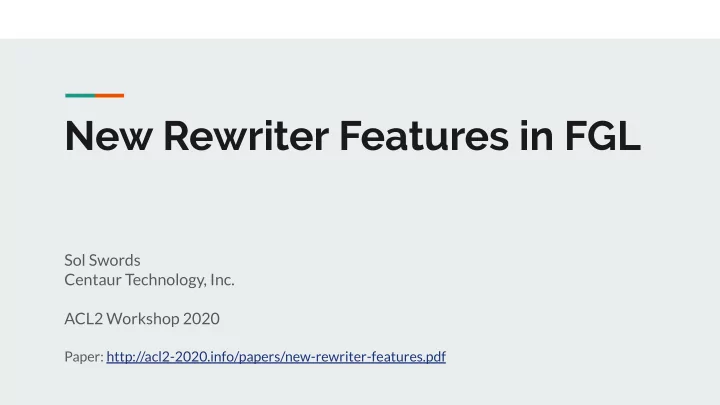

New Rewriter Features in FGL Sol Swords Centaur Technology, Inc. ACL2 Workshop 2020 Paper: http://acl2-2020.info/papers/new-rewriter-features.pdf
What is FGL? Bit-blasting framework, successor to GL. Core of FGL is a rewriter inspired by ACL2’s. Compared to GL: Uses rewriter as its core; basic behavior is coded as rewrite/meta rules rather than built in ● Supports incremental SAT ● Improved debugging features ● Compared to ACL2 rewriter: No linear, nonlinear, typeset reasoning ● Bit blasting emphasis: creates Boolean variables from unresolved IF tests ● Verified clause processor, modulo trust tags for (e.g.) external SAT solver integrations.
Challenge Replace hand-coded, meta-level “primitives” with rewrite rules Make it easy to code custom behavior for new functions and types Make it easy for rewrite rules to use syntactic and heuristic information → Make rewrite rules as powerful as meta rules!
The kind of rewrite rule I want (equal (foo x y) (let ((sauce (bar x))) (if (syntactically-true-p sauce) (fuz y) (let ((crust (biz x y))) (prog2$ (cw “Crust term: ~x0~%” (syntactic-term crust)) (if (syntactically-posp (deliciosity crust)) (buz crust y) (do-not-apply-this-rule-after-all)))))
Reasons we can’t do this in the ACL2 rewriter Can’t examine term syntax from the RHS of a rule ● Can’t abort a rule application from within its RHS ● Can’t derive semantic information from syntactic checks ● Need (syntactically-posp x) to imply (posp x) ○ Need (syntactically-true-p x) to imply x ○
Outline: Two tweaks and one feature Tweak 1: unequiv -- “anything goes” equivalence relation ● Tweak 2: abort-rewrite -- like it says ● Feature: Binder rules ● Short summary here, details in the paper ○
unequiv (defun unequiv (x y) (declare (xargs :guard t)) t) This is an equivalence relation! ● All objects are unequiv to each other ● You can do anything you want when rewriting under an unequiv context ●
Entering an unequiv context Congruence rules can induce an unequiv context on irrelevant arguments: (defun fgl-prog2 (x y) y) (defcong unequiv equal (fgl-prog2 x y) 1) Sneak peek ahead to binder rules: (defun bind-var (x y) x) (defcong unequiv equal (bind-var x y) 2) B inds free variable x to the result of rewriting y under unequiv context.
Propagating the unequiv context When a function or lambda call is in an unequiv context, its arguments are too. As if we had (defcong unequiv unequiv (f …) n) For all functions f , argument indices n (plus special support for lambdas). This is the only special support needed in the rewriter. Would likely be easy to add to ACL2.
Allowed under unequiv context Rewrite anything to anything else. ● Using plain rewrite or meta rules with unequiv as the equivalence relation -- trivial proof obligation ○ Application: Arbitrary, extralogical debugging/exploration routines ○ Syntax-interp : access syntax of terms as in syntaxp / bind-free ● Print/analyze/debug results from rewriting ○ Fgl-interp-obj : if argument rewrites to a quoted term, then rewrite that term ● Other future special forms? ●
abort-rewrite Just like the name. Logically an identity function, to make it easy to prove rules that use it. Typical usage: (equiv lhs (cond (test1 rhs1) (test2 rhs2) (t (abort-rewrite lhs))))
Binder rules (sketch) When applying a rewrite rule, free variables may be soundly bound to anything. ● Due to the fact that you can instantiate a theorem with any substitution. ○ (bind-var x y) returns x , binds (free variable) x to result of rewriting y under unequiv context ○ Problem: when proving the theorem justifying the rule, free variables are just free variables ● Similar to how (syntaxp (syntactically-integerp x)) doesn’t imply (integerp x) ○ (bind-var x (make-constant-integer)) is still logically just x, about which we know nothing ○
Solution E.g.: Instead of bind-var , use (bind-positive-int x y) Logically: x is a free variable, (bind-positive-int x y) defined to be (pos-fix x) ● Binder rule determines how x will be bound when rewriting ● Rule shows that we can select an x that bind-positive-int will return unchanged: ● (implies (equal x (choose-positive-int y)) (equal (bind-positive-int x y) x) Effectively: If we choose x to be the result of rewriting (choose-positive-int y) , then bind-positive-int will return x unchanged.
Original example, in FGL (equal (foo x y) (let ((sauce (bar x))) (if (bind-syntac-true-p sauce-provable sauce) (fuz y) (let ((crust (biz x y))) (fgl-prog2 (syntax-interp (cw “Crust term: ~x0~%” crust)) (if (bind-syntac-posp crust-delishp (deliciosity crust)) (buz crust y) (abort-rewrite (foo x y))))))
(def-fgl-rewrite fgl-equal (equal (equal x y) (cond ((check-integerp x-intp x) (cond ((check-integerp y-intp y) (and (iff (intcar x) (intcar y)) (or (and (check-int-endp x-endp x) (check-int-endp y-endp y)) (equal (intcdr x) (intcdr y))))) ((check-non-integerp y-non-intp y) nil) (t (abort-rewrite (equal x y))))) ((check-booleanp x-boolp x) (cond ((check-booleanp y-boolp y) (iff x y)) ((check-non-booleanp y-non-boolp y) nil) (t (abort-rewrite (equal x y))))) ((check-consp x-consp x) (cond ((check-consp y-consp y) (and (equal (car x) (car y)) (equal (cdr x) (cdr y)))) ((check-non-consp y-non-consp y) nil) (t (abort-rewrite (equal x y))))) ((and (check-integerp y-intp y) (check-non-integerp x-non-intp x)) nil) ((and (check-booleanp y-boolp y) (check-non-booleanp x-non-boolp x)) nil) ((and (check-consp y-consp y) (check-non-consp x-non-consp x)) nil) (t (abort-rewrite (equal x y))))))
In the paper More explanation of binder rules ● Implementation problems and solutions ● What would it take to port these features to the ACL2 rewriter? ●
Recommend
More recommend